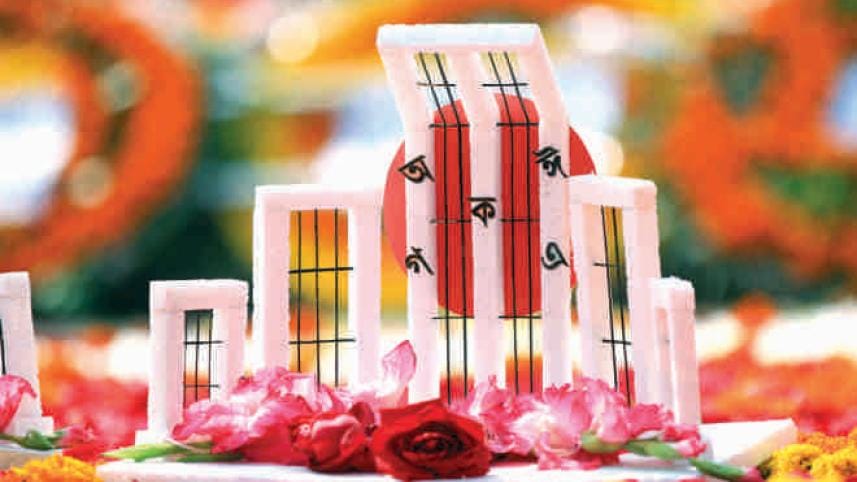Alas, my Bangla lingo!

Throughout the 1960s, come every Ekushey February, we would see frantic efforts by mainly corporations, business houses and shop owners covering (albeit temporarily) their Urdu and English signboards with paper, lest the zealous movers of Bangla as a state language of Pakistan consider it their right to desecrate them with alkatra. Almost nothing on the street was in Bangla, and therefore the struggle to earn an equitable and honourable place for our mother tongue.
The Dhaka-born lawyer-lyricist-singer Atul Prasad Sen (1871 1934) had thus penned with utmost passion in Bangla, which translated reads:
Our pride, our hope …
Alas, my Bangla bhasha.
Over the last almost sixty years, the three languages have had mixed fate on billboards, hoardings and name plates; Urdu began to disappear before or after the 1969 mass movement, and was completely removed from public appearance in 1971. English retained its place and with gusto. And Bangla, (tch! tch!tch!) is still struggling in its homeland. I wonder if our heavy dating with English may one day lead us to a "Bengali Land".
Our schools, colleges and universities have English names. All the cardinal and sub-cardinal directions have been taken in English. However, no educational institution has been named Uttor-Dakkhin or Purbo-Paschim as yet. The name of several reputed universities of English-speaking countries have been plagiarised. Some English, American and Australian cities and dales, oceans and rivers find themselves glorified on signboards in our quest for knowledge. Academic prospectus are generally in English with a few exceptions. The driven-out colonialists, led by Mountbatten and co., would particularly have been very amused.
Manufacturing industries and commercial business houses are widely named in English. Their reasoning: 'We have to communicate with the outside world'. Psst! That world also consists of houses and brands named Daihatsu, Fuji and Yamaha, Birla, Pakeezah and Druk.
You will come across rose (that's very much an English entitlement) instead of golap, Thames and Yangtze instead of Buriganga or Turag, building instead of ottalika, restaurant instead of bhojonaloy, well beyond our big cities.
Consumer products are by and large in English; biscuits, chocolates, toiletries, stationery, you name it. An entire tube of toothpaste made in Bangladesh may not have a single letter in Bangla. And we still feel fresh! Ahhhh…
Visiting cards, including mine, are in English. Some of them have a Bangla insertion on the side opposite to English, but there too the company/trade/organisation's English name is written in Bangla font.
We almost never ever utter our mobile telephone number in Bangla. Perhaps that is how it has been from the beginning, and we all got used to saying, calling and saving in English, so much so that now a number communicated in Bangla may well raise confusion.
Apartment buildings, restaurants and guest houses have the most outrageous names in English, occasionally in outlandish French (Pourquoi, Dieusait?), which very few people are able to pronounce. The idea, I believe, is to appear just that, bizarre and mysterious to draw customers and keep away intruders; an inexplicable thought indeed. Interestingly, establishments named in Bangla will have the signpost rendered in English; for instance (not a real entity) a building's name will be signposted 'Sagorika' but not in the Bangla font.
Services for construction, building materials, medical, cellular network and matchmaking (no relation) are named and advertised in English even in the Bangla media. That is not the real reason why buildings are tumbling, treatment is often denied, talks are failing and marriages are on the rocks.
TV ads appear to be in Bangla but there will be many foreign innuendoes, such as hello, hi ouch and yahoos, not to speak of the alien attire and body language. Amazingly, Bengali language song contests have a Grand Finale, never a "sarambor porishamapti".
Most alarmingly, government establishments and universities (public as well as private) publicise notices and adverts in English, unbelievably in Bangla dailies and online versions. Now that definitely was not the spirit behind the slogans since 1948. While one may accept e-tendering in Bangla newspapers in English with a pinch of salt, general announcements being printed nowadays are unacceptable.
The silver lining – yes, there is one - is that despite the allure of the alien domain, we have made almost insurmountable progress since the last couple of decades in our songs, theatre and painting, rooting them intrinsically to our language, culture and heritage. That is the bare evidence that we nurture Bangla in our hearts. Yet, we still suffer a complex, dare I say inferiority, to use our matribhasha in all spheres. We can only improve from here on if we understand the need to arrest the degeneration and corruption of our mother tongue.
The writer is a practising Architect at BashaBari Ltd., a Commonwealth Scholar and a Fellow, a Baden-Powell Fellow Scout Leader, and a Major Donor Rotarian.

 For all latest news, follow The Daily Star's Google News channel.
For all latest news, follow The Daily Star's Google News channel.
Comments